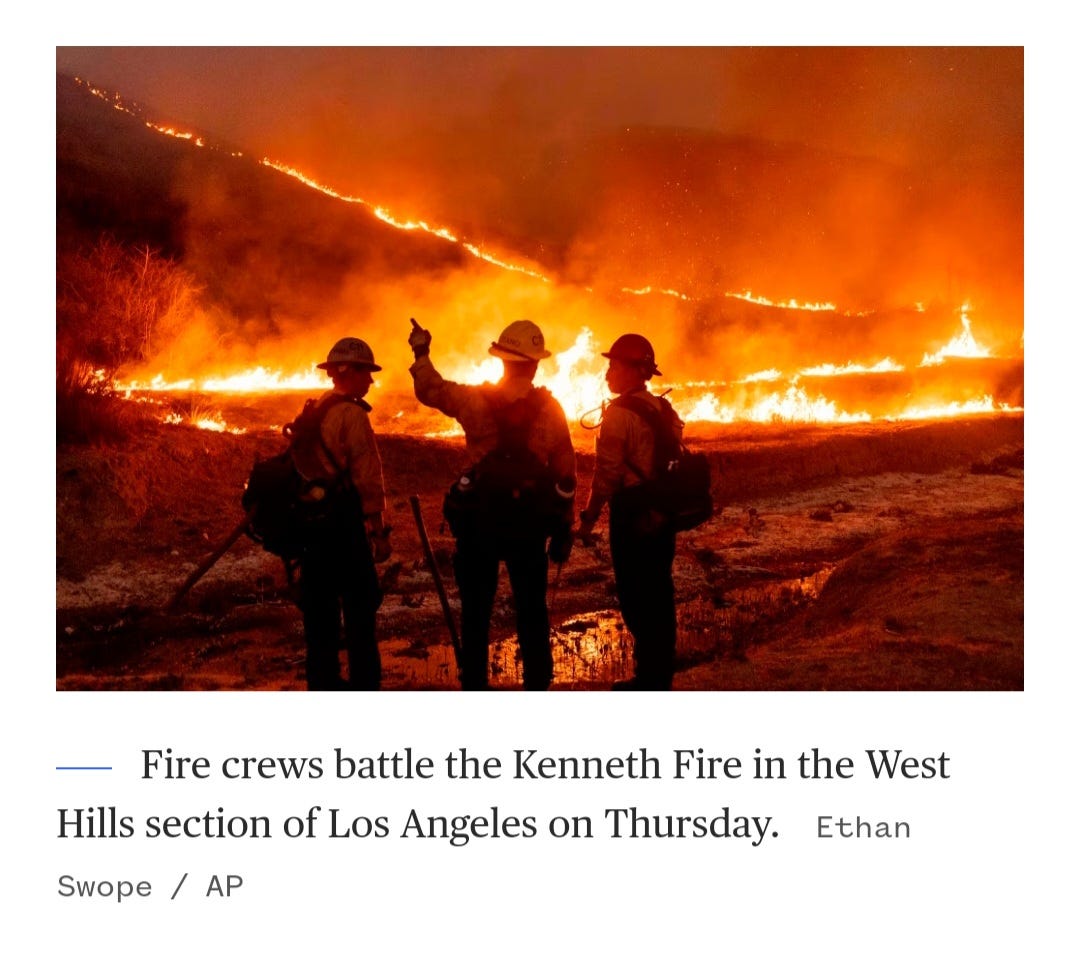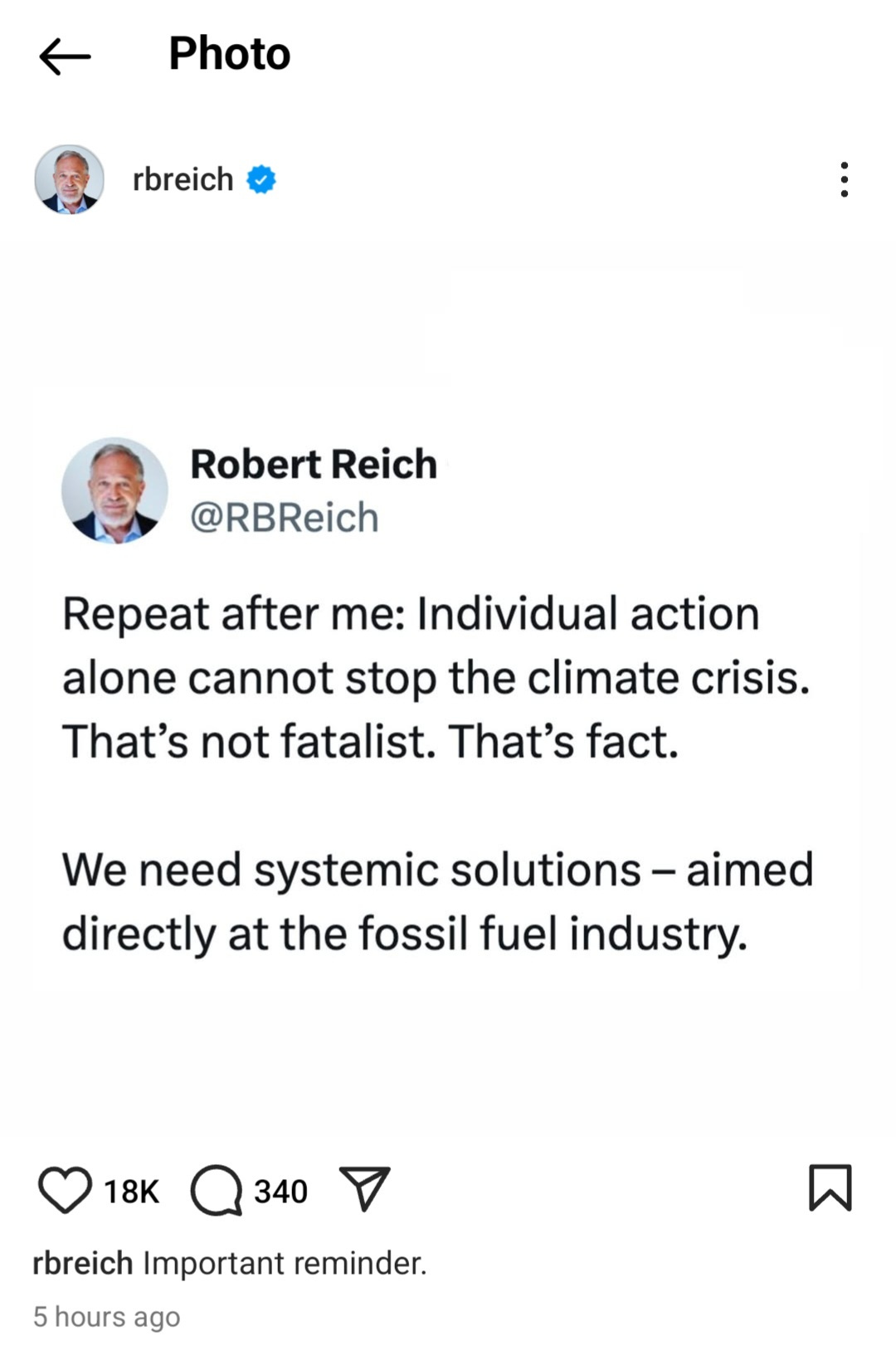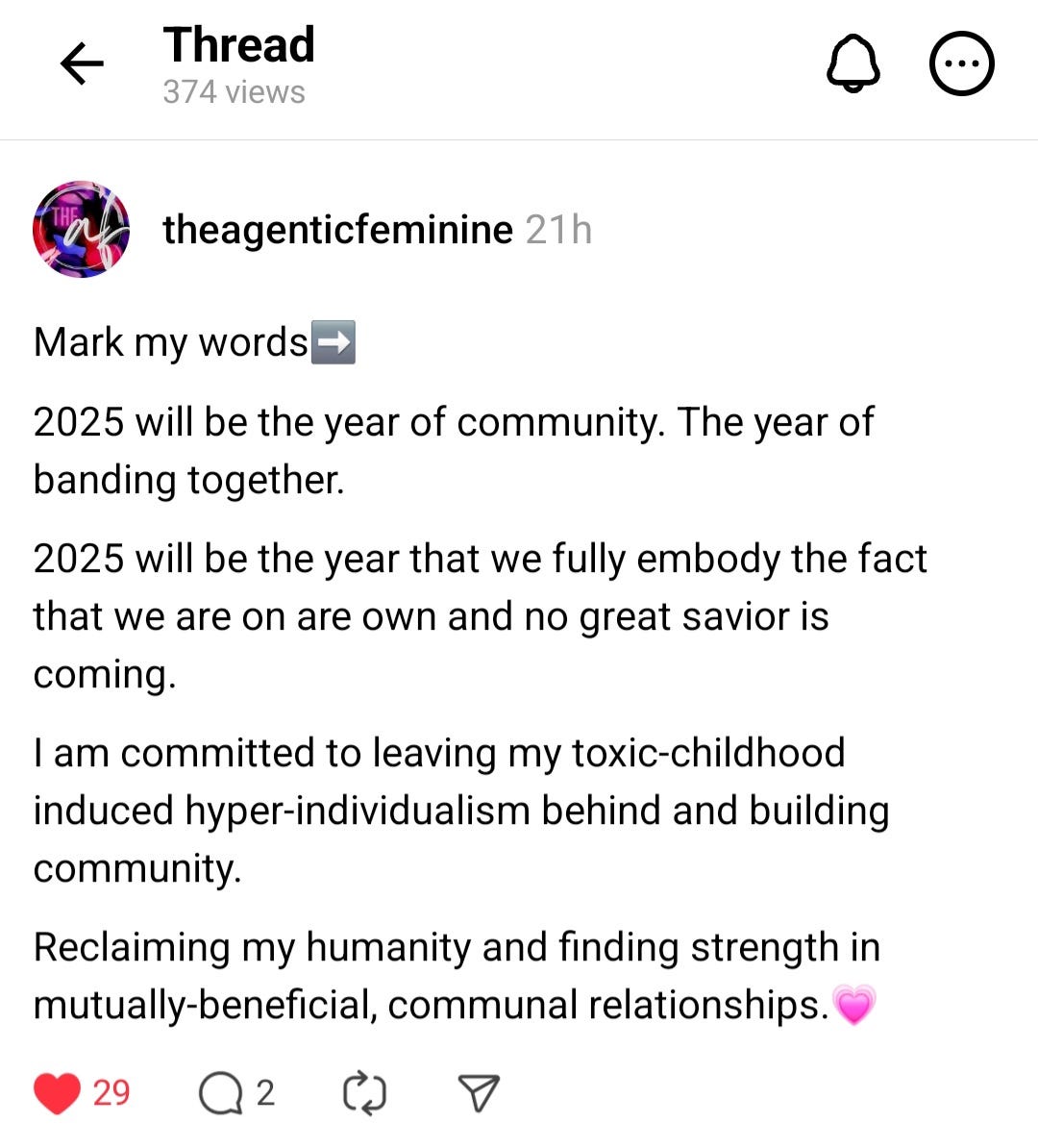Hello to 2025, we made it! I’m so thrilled you’re here!
I live in the Northeast US, we are freezing at the moment, and years of trial and error have taught me that I find the coldness and boredom of January much more survivable, almost pleasant, if I refrain from the cultural pull and pressure to make New Year’s resolutions. This seems an especially sound decision this year - let’s face it, we’re barely a week into 2025, and anyone’s “New You/Be Happier/More Productive/Positive Whatever” journeys have already been abruptly shredded with the disastrous news out of Los Angeles. Unless you are currently existing in a bubble without phone or news access - and if you are, sincerely God bless you, no judgment! - you are gut-wrenched at this tragic devastation from Southern California. It would take a staggering amount of toxicity to find any positivity in this sheer terror.
I’m concluding this newsletter with some links to resources to help our friends, families, and strangers in Los Angeles. May this nightmare end soon.

When these types of climate disasters strike - be they firestorm, hurricanes, tornadoes, etc - I’ve noticed two trends that occur in tandem and without exception: 1) people with physical proximity to the disaster immediately respond with a helping hand in whatever way they can and demonstrate the best humanity can offer; and 2) people online and physically removed from the particular disaster at hand respond with a disturbing lack of empathy, performing humanity at its worst (not all! This is a trend line!). I lived in New York City in 2012, during Superstorm Sandy. We also experienced a profound lack of empathy from people outside our city coupled with a beautiful on-the-ground, real-life communal and humanitarian response. This specific and consistently recurring lack of empathy is alarming, not to mention wholly hypocritical. So much “you chose to live there” - which means, what, exactly? We all have to live somewhere, and literally every dot on the map experiences, checks notes, weather.
Not to mention, by this point, most of these extreme and dangerous weather events result from escalating climate change, which is happening to everyone no matter where they live.
In light of that, and as someone endlessly curious about and fascinated by cultural shifts: their underlying machinations, the powerful people or institutions who popularize trends and for what aims, their slowness or swiftness, how a trend can go from cool to trashy in a somewhat short amount of time - I have found myself wondering whether certain trends will become classified as shameful and/or trashy as man made climate change worsens. In particular: recreational AI use; and jet setting.
AI is already deeply unpopular - we know it intends to crush art and erase artists by stealing their creativity and labor. That alone is bad enough, but now we know that it’s accelerating already-terrifying climate change at alarming rates, and the verdict seems to be in. I do wonder if you’re going to start seeing a movement, or at least a trend, towards publicly shaming anyone who utilizes it recreationally on their socials.
Same with jet setting, meaning taking lots of luxury trips and vacations, most lasting a week or less, requiring flights around the country or the world. You can easily pinpoint Instagram as the culprit behind the recent rise in recreational plane traffic. The visually-based social media machine rewards, and thus popularizes, posting photos in increasingly exotic locales. The app literally changed the spending habits of Americans from less material goods to more travel expenses. From the increased carbon footprint of more and longer commercial flights to thousands of tourists yearly traipsing and tromping through nature settings to get more likes and follows on their perfect photo shoots, “doin’ it for the ‘gram” has been deeply problematic for the environment.

That being said, we have irrefutable evidence that the majority of climate change is being caused by corporations that emit fossil fuels, and that individual choices don’t matter much until that problem is fixed. But at this point, I think it’s clear that community and solidarity will become tantamount to survival, if not always the day-to-day, then certainly survival of the future. I don’t know that stopping recreational AI use and taking fewer commercial flights will matter that much, but I can also see the argument that declining or eliminating those habits could help - at least on paper.
To lay out my own cards, I personally hate AI and find it a social ill. It’s annoying to navigate, its creators and purveyors are trying hard to stamp out art and resistance, and I do make a rude face anytime I see a person or company using it when they don’t have to. Jet setting, on the other hand, has my sympathies. I love to travel, I have taken probably more than my fair share of recreational flights to places I had no real need to visit. I vehemently defend the need for vacations and time off, I cherish the memories I’ve made and personal horizons I’ve expanded. But. If we see clear cut evidence that individuals taking fewer flights would actually improve the future prospects of the earth for its next generations, then yeah, I’d travel less.
My curiosity is less about whether some people making certain lifestyle changes/cutbacks would make a dent in horrifying recurrent climate catastrophes, than whether these are cultural norms that will evolve, even if they don’t make complete rational sense by the data. Cultural trends rarely do. I think it will become quite interesting to see if, particularly with respect to jet setting, something very recently cast as the epitome of cool and enviable, will become low-brow, trashy behavior for which individuals will endure social shame.
Sending love to L.A. and rage to the fossil fuel assholes who helped this along.
As promised, here is a list of organizations taking monetary donations to help those hurt by the fires in Los Angeles. I’ve waited a few days myself to send any money, just to give time to vet for scams. I’ve followed the lead of a few journalists and creatives I follow on social media who all live in L.A.
Baby2Baby - a nonprofit focused on getting needed supplies to babies displaced from their homes: diapers, wipes, formula, clothes, blankets, baby hygiene products, etc.
Pasadena Humane Society - helping pets with burns
Anti-Recidivism Coalition - helping incarcerated firefighters
Open Air Worker Emergency Fund - helping provide safety to workers whose employment mandates they be outside, as L.A.’s air quality now and for the foreseeable will be unsafe to breathe for extended lengths of time




